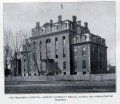Freedmen's Hospital and Asylum
| Freedmen's Hospital and Asylum | |
|---|---|
 | |
| Established | 1862 |
| Opened | 1863/1908 |
| Closed | 1975 |
| Current Status | Preserved |
| Building Style | Pavilion Plan |
| Location | Washington, DC |
| Alternate Names |
|
History
The Freedmen’s Hospital was founded in 1862 in Washington, DC. It was the first hospital of its kind to aid in the medical treatment of former slaves. Later it became the major hospital for the African American community in Washington, D.C. The hospital was founded on the grounds of Camp Barker at 13th and R Streets in Northwest Washington. It remained in that location until a new building was completed in 1909 at Bryant and 6th Street. Through much of its history the hospital was managed by the U.S. government.
In 1868, six years after its founding, Freedmen’s Hospital became a teaching hospital for the Howard University Medical School. One of the first members of the school’s faculty was Lieutenant Colonel Alexander T. Augusta, M.D. Augusta had been placed in charge of the hospital in 1863 and thus was the first black hospital administrator in U.S. history. He was also on the faculty for the Howard University medical school along with six other faculty members, including Anderson Ruffin Anderson, another African American. Augusta remained on the faculty from 1868 to 1877.
Despite federal control, Freedman's Hospital was often touched by scandal between 1872 and 1910. Every single hospital administrator, whether white or black, was involved in some sort of scandal from misconduct to malpractice. Numerous cases were brought against hospital officials who utilized hospital services for personal gain. Other administrators were neglectful and some were charged with embezzlement. While the Hospital's leadership was tarnished, the doctors and nurses continued to provide vital treatment to often impoverished District of Columbia residents. The Freedman's Asylum, which was connected administratively to the Hospital, provided care for aged and disabled black patients.
Early in the 20th Century the U.S. Congress authorized the construction of a new hospital, which was completed in 1909. The new 278-bed state-of-the-art facility now attracted able administrators. Perhaps the most famous was Charles R. Drew, M.D., a surgeon and hospital administrator. Drew, already nationally famous for his blood plasma research, ran Freedman's Hospital, was a medical professor at Howard University Medical School and chair of the school's Department of Surgery from 1941 to 1950. Under his leadership the surgery department grew in size and reputation.
In 1967 Freedmen’s Hospital was taken over by Howard University and operated until 1975. A new university hospital opened in 1975 at 2041 Georgia Avenue. The former building now houses the Howard University College of Nursing and College of Allied Health Sciences. Howard University continues to manage the facility , which is now called Howard University Hospital. The Bryant Street building now houses Howard University's John H. Johnson School of Communications. [1]
